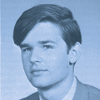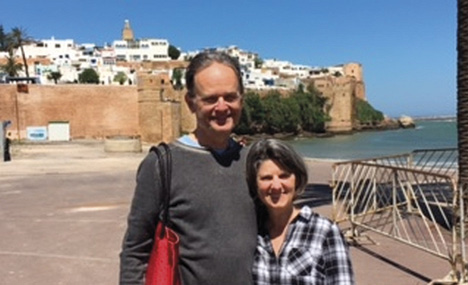Paul Moore – 50th Reunion Essay
Paul Moore
 1701 Tacoma Avenue
1701 Tacoma Avenue
Berkeley, California 94707
bustamoore@gmail.com
510-414-9026
Spouse(s): Debra Busta Moore (1975)
Child(ren): Eli Neruda Moore (1977); Avery Busta Moore (1980); Paul Quincy Moore (1983)
Grandchild(ren): Antonio Jimenez Moore, Alicia Jimenez Moore, Amo Hoernig Moore
Education: University of California, Davis, M.A. English (1984); The Wright Institute, PhD. Clinical Psychology (1993)
Career: Clinical Psychologist, 25 years; Mental Health Agency Supervisor & Clinical Director, 25 years
Avocations: Meditation, playing basketball
College: Berkeley
At graduation, all three national TV networks broadcast my Yale bed sheets. American viewers got to see that even Yale students opposed the Vietnam War and military draft. I had spray-painted “WE WON’T GO” on my sheets, taped them to curtain rods, and carried them in the procession. Seems outrageous now, but not then.
My childhood was unusual for a third-generation Yale student, in that I grew up in a poor, Black neighborhood, where my parents ministered at a community church. On many weekends, my grandparents’ chauffeur brought us to their rural estate.
At age 16, my father took me to the March on Washington where I heard Dr. King and had a transforming experience. I identified with this crowd of peaceful, active, generous everyday people, and I wanted my life to be a credit to them.
I knew from lived experience that Black people were an important part of America, and that they were in no way inferior to us whites, but lived in cruel circumstances for political reasons. So it was surprising and disappointing to me that the Yale faculty—even in my major, political science—did not include the Black community in their concern or scholarship. When I felt devastated by the assassinations of Dr. King and Robert Kennedy, I had nowhere to express my grief and anger. Nor did I have the emotional maturity to understand what I was going through.
The following summer, I worked as a Senate intern and, consequently, was in Chicago for the Democratic convention. When the military tanks of the National Guard rolled down the avenue in front of me, I was stunned. The following spring of senior year, I recruited a dozen friends to co-sign a letter demanding Yale dissociate itself from ROTC, a move that prompted the Ingalls Rink gathering.
Since that graduation long ago, I have been lucky in love, having met Debra Busta a few months after graduation. We have had so many happy times: all the grueling work of active parenting three sons has brought us sustained delight.
After a serious illness, and a couple of career starts which went nowhere, at age 40 I earned a PhD and license in clinical psychology. Since then, I have maintained a satisfying private practice of long-term psychotherapy for individuals of all ages, and worked in community mental health as supervisor and clinical director. As it turned out, my agency work mostly serves people in Oakland’s Black and South East Asian immigrant neighborhoods.
At Yale, I learned to think critically and to process concepts efficiently. I encountered gifted intellectuals and many fascinating people. However, the faculty and administration’s failure to help us students understand our world was my most “educational” experience, because it forced me to look elsewhere for lux et veritas.
I enjoyed many friendships in Berkeley College, at the NEWS, and at Elihu. I wish all of you health, happiness and freedom in the coming years; I’ll always treasure the friendships I formed at Yale.

If the above is blank, no 50th reunion essay was submitted.
